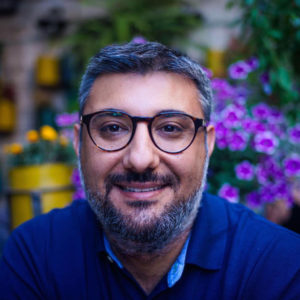Life after the Strassler Center: Ümit Kurt, Ph.D. ’16
The career path that recently minted Ph.D. students follow can be winding, but Ümit Kurt’s path has crisscrossed the globe.
In 2016, after becoming the second student to receive a Ph.D. in Armenian Genocide studies from Clark University’s Strassler Center for Holocaust and Genocide Studies, Kurt could have resumed an academic career in Turkey, where he had taught at Sabanci University in Istanbul during graduate school. But with the political situation there increasingly grim for Turkish academics and intellectuals, Kurt opted to stay in Massachusetts, accepting a post-doctoral fellowship at the Center for Middle Eastern Studies at Harvard University.
Following a productive year of research, he relocated to Israel in fall 2017, having secured the five-year Polonsky Fellowship from the Van Leer Jerusalem Institute. The Strassler Center has long nurtured connections with Israeli institutions, especially since establishing formal ties through an ongoing Israel Academic Exchange. Thus, Kurt knew that, despite the still evolving position of the Israeli government regarding the Armenian Genocide, he would find receptive colleagues.

The Van Leer Jerusalem Institute, dedicated to innovative interdisciplinary research, is a special place for scholars. A leading center for advanced studies and for intellectual public discourse in crucially important and socially sensitive fields, it is home to renowned researchers. They promote innovative ideas in the humanities and social sciences that foster humanistic, democratic, and liberal values in Israeli social discourse.
The institute proved an ideal setting for Kurt to broaden his scholarship beyond his dissertation, which explored the confiscation of Armenian properties, wealth transfer, local elites, and the Aintab Armenians. Making excellent use of his first fellowship year, he published “History and Historians in Turkey: Concepts and Practices” (Ankara: Heretik, 2018). He then turned to a new book project that examines the motives of ordinary perpetrators during the Armenian Genocide. In this study, focusing on the biographies of three perpetrators, Kurt analyzes the reasons and mechanisms for Muslim civilian participation in acts of killing.
This fall finds Kurt in California, where he began an appointment as the Henry S. Khanzadian Kazan Visiting Professor in Armenian Studies at Fresno State University. The position previously was held by Kurt’s Strassler Center colleague, Khatchig Mouradian, Ph.D. ’16, who was the first student to receive a doctorate in Armenian Genocide studies from Clark.
During Kurt’s semester-long visit, he will teach “The Armenian Genocide in Comparative Perspective” and deliver three public lectures: “A Rescuer, an Enigma, and a Génocidaire: Cemal Pasha”; “Proactive Local Perpetrators: Mehmet Yasin (Sani Kutluğ) and Ali Cenani”; and “The Curious Case of Ahmed Necmeddin Bey: A Look into the Sociopolitical Climate in Aintab on the Eve of 1915.”
Following his semester in Fresno, he will return to the Van Leer Jerusalem Institute, where he will teach a course on the collapse of the Ottoman Empire, nationalism, and mass violence.
Kurt remains close with his mentor, Taner Akçam, with whom he published “The Spirit of the Laws: The Plunder of Wealth in the Armenian Genocide” (2015). On his first trip to Israel in summer 2017, Akçam visited his former student.
“With the evolving geo-political situation in the Middle East,” Akçam observed, “Ümit is well positioned to educate his Israeli colleagues about the Armenian Genocide as he deepens his understanding of the Holocaust. At the same time, his impeccable scholarship will make a difference in the gradual process to secure Israeli recognition that the mass violence carried out against Armenians absolutely constituted genocide.”
Audiences at his talks and presentations have demonstrated that Israelis want to learn more about the Armenian Genocide. Indeed, Kurt is studying Hebrew to ensure that he can reach them. If so, he may find that his path has led him to a lasting academic home.


